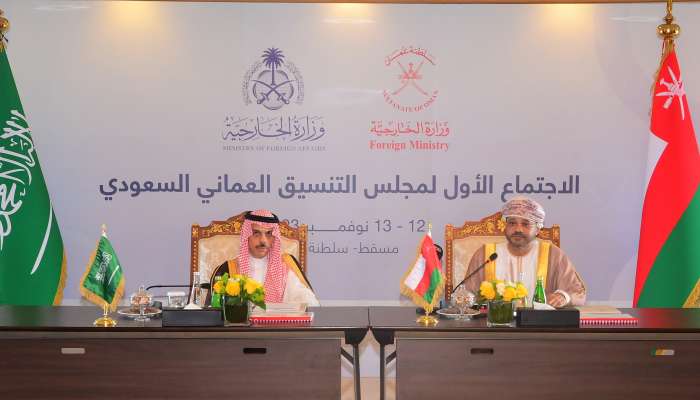
Muscat: The Omani-Saudi Coordination Council held its first meeting in Muscat on Monday. The meeting was jointly chaired by Sayyid Badr Hamad Al Busaidi, Foreign Minister, and Prince Faisal Farhan Al Saud, Minister of Foreign Affairs of the Kingdom of Saudi Arabia (KSA).
During the meeting, the two sides reviewed bilateral relations and expressed satisfaction with the positive results achieved. They underscored the significance of developing coordination and shaping joint positions towards regional and international issues of common interest.
In his speech, Sayyid Badr said that, over the past few years, Omani-Saudi relations saw steady growth in various fields, with investment initiatives forged and commercial activities expanded.
In this context, Sayyid Badr pointed out that the opening of the Rub-el-Khali land port between the two countries in 2022 added momentum to land transport between the two countries.
Sayyid Badr said that alternative energy projects and hydrogen production are at the forefront of the two countries' common interests. This is in addition to cooperation in the sectors of energy, logistics, maritime transport and infrastructure.
Sayyid Badr stressed the need to maximise benefits from natural resources that abound in the two countries, as well as their prominent geographical locations.
Sayyid Badr expressed the confidence that joint initiatives for cooperation can be implemented within the framework of the Omani-Saudi Coordination Council, its subcommittees, its general secretariat and follow-up mechanisms endorsed.
For his part, Prince Faisal said that Saudi-Omani relations are witnessing steady growth under the patronage of the leaderships of the two countries. Steps have been made to consolidate cooperation and enhance the two countries’ regional and international role in a manner that contributes to establishing security and stability in the region, besides achieving the aspirations of the two countries’ peoples.
Prince Faisal added that the Council constitutes a podium for the two countries’ joint action in maximizing benefits from investment resources. He stressed that the consensus of views on all issues demonstrates the importance of maintaining coordination on bilateral, regional and international issues and enhancing political consultation on all matters of common interest.
He added that the coordination council and its subcommittees (handling political, security, economic and investment affairs) provide an effective instrument for deepening cooperation in tackling various issues, including combating terrorism, protecting waterways and developing sources of renewable and clean energy.
The meeting saw the participation of heads of the council’s subcommittees and its secretariat general.
The meeting was held in response to the two countries leaders’ directives to enhance cooperation in a manner that consolidates the deep-rooted relations and meets the aspirations of their peoples.